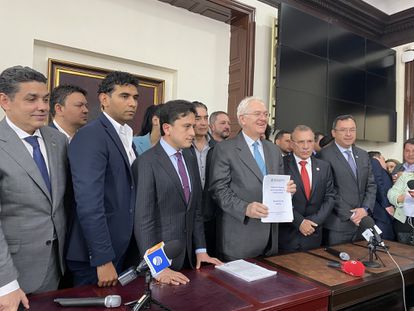The Minister of Finance, José Antonio Ocampo, files the Tax reform project before the House of Representatives, in Bogotá, on August 8, 2022.rrss
This Monday, before noon, the new Colombian government took its first big political and economic step.
The Minister of Finance, José Antonio Ocampo, filed an ambitious tax reform in the House of Representatives.
It seeks to raise an additional 2.6 trillion pesos in 2023, 1.78% of GDP, and it does so essentially by charging more to higher-income people, financial companies and the extractive sector, and unhealthy or environmentally unfriendly products.
In his presentation, Ocampo stressed that the reform seeks to maintain the country's fiscal stability and reduce inequality and poverty, two goals aligned with the discourse of the first government elected by the left in the country.
He clarified that the calculation is that the reform would reduce the Gini coefficient (which measures inequality, in which 0 would be perfect equality and 1 the concentration of everything in a single person) from 0.514 to 0.491, the first time since it was calculates in which the country would fall below 0.5.
He also stressed that the proposal, if approved as it is by Congress, will only affect people who earn more than 10 million pesos a month, 2% of Colombians.
That marks a distance with the reforms presented by the previous government, which would affect more people.
The proposal does not modify VAT, the value added tax that is charged to consumers and impacts all consumers, it eliminates the highly criticized days without VAT and creates a 10% tax on the sale of sugary drinks and ultra-processed foods.
"This is not to generate money, the ideal collection of these taxes is zero," said Ocampo, this Monday, about these so-called healthy taxes.
Instead, the reform focuses on increasing income taxes and occasional profits only for those with higher incomes, and creating a permanent wealth tax for those with more than 3,000 million pesos.
With all these changes, the Treasury expects to collect more than 8 trillion in 2023, 0.56% of GDP.
The rest of the collection would come from taxes to specific companies.
It is not a general increase in the income tax rate, as governments have done in the past, since they are high compared to other countries.
In particular, it would make permanent a 3% surcharge on the income tax that the financial sector pays today, but on a temporary basis.
It also seeks to charge 10% on mining and oil exports when the international price of each product is very high and would reduce the benefits of Free Zones, among others.
In addition to healthy taxes, the reform seeks to create environmental taxes on single-use plastics and carbon, thereby reinforcing the message of environmental protection that is at the heart of the Government of Gustavo Petro.
Subscribe here
to the EL PAÍS newsletter on Colombia and receive all the key information on the country's current affairs.

